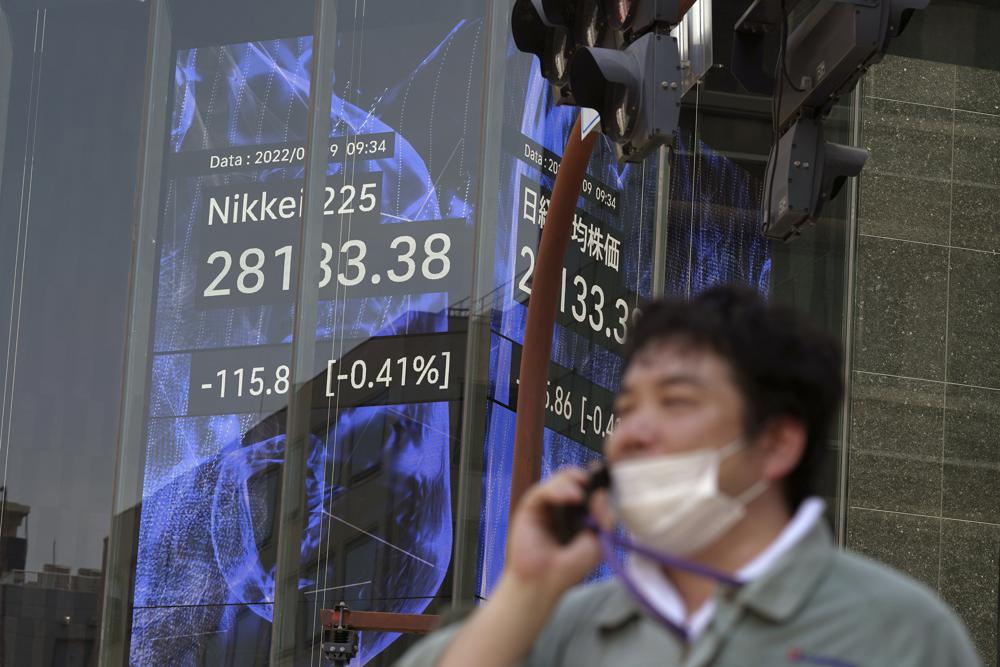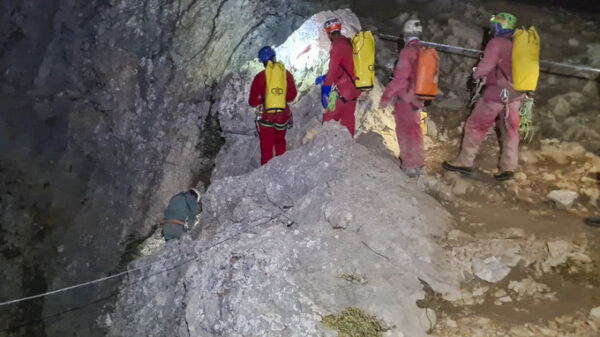A person wearing a protective mask walks in front of an electronic stock board showing Japan’s Nikkei 225 index at a securities firm Tuesday, Aug. 9, 2022, in Tokyo. Asian shares mostly declined Tuesday amid a global fall in technology shares, including Japan’s SoftBank, which has reported hefty losses caused by the market downturn. (AP Photo/Eugene Hoshiko)
TOKYO (AP) — European benchmarks were mixed Tuesday after gains in most Asian markets despite weakness in technology shares, including Japan’s SoftBank.
Such worries are coming on top of concerns about inflation and what central banks might do to curb that trend. Higher interest rates tend to work as a minus for share prices.
Fighting in the Ukraine and attacks on Europe’s biggest nuclear plant are other factors hanging over markets.
Moscow and Kyiv have accused each other of shelling a nuclear power plant in Russia-occupied southeastern Ukraine, attacks that have fueled international concerns. The Zaporizhzhia nuclear power plant has six nuclear reactors, and the fighting around it has raised the danger of a nuclear accident.
France’s CAC 40 inched up less than 2 points to 6,526.13, while Germany’s DAX fell 0.4% to 13,632.20. Britain’s FTSE 100 gained less than 0.1% to 7,489.68. The futures for the S&P 500 and the Dow Jones Industrial Average edged 0.2% higher.
In Asian trading, Japan’s benchmark Nikkei 225 dipped nearly 0.9% to finish at 27,999.96.
Japan’s technology investor SoftBank Group Corp. dropped more than 7%. On Monday it reported a record quarterly loss of $23 billion. A global nose-dive of technology-related issues, such as Chinese e-commerce giant Alibaba, has weighed on its sprawling portfolio of investments.
Australia’s S&P/ASX 200 edged up 0.1% to 7,029.80. South Korea’s Kospi edged 0.4% higher to 2,503.46.
Hong Kong’s Hang Seng erased earlier gains, falling 0.2% to 20,003.44, while the Shanghai Composite edged up 0.3% to 3,247.43.
Analysts monitoring Asian markets said regional tensions remain a risk because of the flareup between China and Taiwan after the recent visit of U.S. House Speak Nancy Pelosi to Taiwan.
China has said it’s extending threatening military exercises surrounding Taiwan, disrupting shipping and air traffic and raising up a notch worries about trade.
“It is worth keeping track of the geopolitical landscape as any major developments on the China/Taiwan front could impact overall risk demand. China confirmed it would extend military drills around Taiwan, and the military will conduct ‘regular’ exercises on the eastern side of the median line of the Taiwan Strait,” said Anderson Alves at ActivTrades.
Also of concern are the rising cases of COVID-19 in China, Japan and some other Asian nations, and their potential impact on supply chains that are a lifeline to some of the region’s biggest manufacturers.
Technology stocks were the biggest drag Monday on Wall Street. The S&P 500 slipped 0.1% to 4,140.06 and the Nasdaq shed 0.1% to 12,644.46. The Dow Jones Industrial Average closed 0.1% higher, at 32,832.54. The Russell 2000 rose 1% to 1,941.21.
It’s a busy week as investors weigh whether the U.S. Federal Reserve’s efforts to cool the economy and quell inflation are working, or whether the central bank will continue aggressively raising interest rates. Investors worry the Fed could hit the brakes too hard and cause a recession.
The Fed is expected to hike short-term interest rates by another 0.75 percentage points at its next meeting.
The U.S. Labor Department will release its July report for consumer prices on Wednesday, followed by its report for prices at the wholesale level on Thursday. Last week, reports showed the U.S. employment market remains strong.
Investors are still reviewing the latest round of corporate earnings, which could also provide more details on how hard inflation is hitting consumers and businesses.
In energy trading, benchmark U.S. crude fell $1.37 to $89.39 a barrel in electronic trading on the New York Mercantile Exchange. It added $1.89 to $90.76 a barrel on Monday.
Brent crude, the international standard for pricing crude, lost $1.41 to $95.24 a barrel.
In currency trading, the U.S. dollar fell to 134.90 Japanese yen from 134.98 yen. The euro cost $1.0239, inching up from $1.0193.
___
Copyright 2021 Associated Press. All rights reserved.






























You must be logged in to post a comment Login